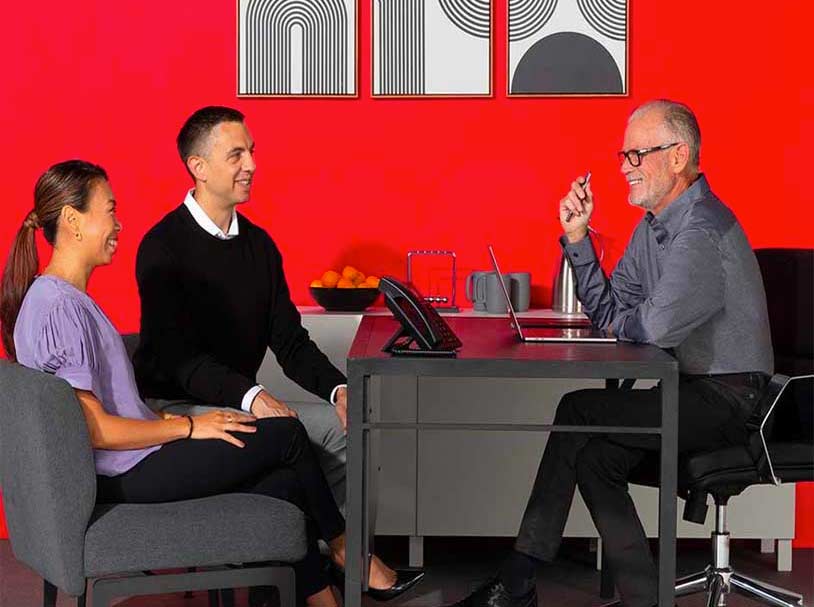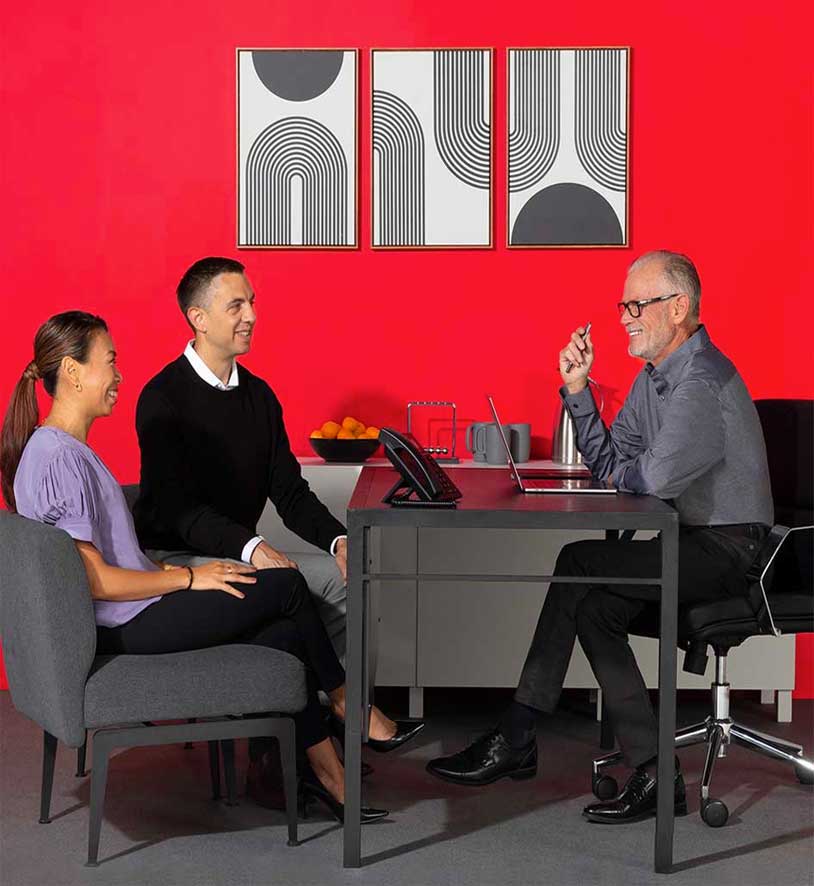Tips for improving phone calls between attorneys, legal staff and clients

Communication is vital in a law practice. From attorneys speaking to opposing counsel, to paralegals conducting research, to potential clients learning about your legal niche, effective communications make for a well-functioning firm of any size or shape.
The lifeblood of communication in all legal practices is the phone call. So how do you master your legal phone calls and business phone system? In this post, we’ll take a look at what makes phone calls effective and how you can get a phone system that will help your staff be more productive and provide a stellar client experience. Oyez! Oyez!
What makes legal phone calls most effective?
Let’s back up a bit and first go over what makes for an “effective” phone call. A lot of people may first learn about your legal practice through word of mouth or an internet search. While that may pique interest, many people are going to want to call you first.
Your staff has to be able to promptly and clearly relay information to your potential clients in a phone call. It could be about your area of legal expertise, office hours, or how to schedule a free consultation appointment to discuss their needs.
Returning clients may be dealing with stressful situations and need help navigating the legal system. If staff can calmly and efficiently answer their questions, you have yourself an effective phone call and, more importantly, a client who feels supported. If they don’t get their needs met, you may have a problem, including eroding any good impression your client might have had.
How can you make telephone calls more effective?
It all starts with clear, simple language with a friendly tone. This is especially hard to do when you are trying to juggle legal briefs and court dates. We get it, you have many demands competing for your valuable time, but you also must clearly communicate with clients on the phone.
During especially hectic times, answer the phone and politely tell callers that it’s busy and you need to put them on hold. Or get a phone system that takes care of simple requests for you. We’ll get to that in a bit. This way you free up staff to take care of the various needs of your clients.
When you are talking with a client, keep it calm and friendly. Answer their questions to the best of your ability. This means that your front-line staff, whether that be an office administrator or a receptionist, needs to be well versed on your practice. If they don’t know an answer, they should offer to schedule a call with the paralegal or lead attorney.
Make great phone calls part of your practice’s culture
Great phone calls and great communication are a pillar of any successful organization.
When you’re hiring staff, make communication a high priority for your candidates. Ask them how they handle conflict, how they communicate, and if they can share specific moments when they’ve had to practice effective communication.
Second, make it an important part of your training procedure. Create documents that can help your staff, new and old, understand how important good communication is for your clients. Train staff how to respond to upset callers and even give them scripts they can use. These scripts can be official policy, like the greeting they say when they first answer the phone, or they can be for specific scenarios, like a client calling because they’re confused by legal terms in a correspondence they received in the mail.
These scripts don’t have to be said verbatim, since that can sound a little robotic and tone is an important part of an effective phone call. You want your staff to be warm, empathetic and energetic—not sound impatient, cold and short. Think about the things you appreciate when engaging with other businesses and implement those ideas with your staff.
How to take phone calls to the next level
Clearly communicating over the phone is a great first step, but there are also technology tools to improve how you manage those phone calls.
A VoIP phone system offers many advanced business features to not only train your staff, but foster effective phone calls with clients. Here are some of the many tools for this available in Ooma Office:
Integrate your phone system with Clio
When placing or receiving calls using the Clio integration on the Ooma Office desktop app, you’ll see a Call Pop—a window on your screen with details about the caller. Think of it as a super-charged caller ID. In addition to name and phone number, the Call Pop pulls in associated legal matters from your Clio database and includes an entry form where you can enter call notes. This integration can help your legal team stay on top of client casework and capture all billable hours.
Record calls for training
Use Call Recording to better train your staff. You can record calls to review later, allowing you to hear how your staff communicates with callers, take notes and circle back with tips from real situations so they can diffuse difficult situations, calm nerves, educate and offer support. Call recording can also play a big role when confirming client notes and documenting billing.
Don’t leave callers hanging
If your front staff is busy and you don’t want your clients left hanging, the Virtual Receptionist has your back. You can set it up to answer basic questions, like a brief description of your field of law or your normal office hours of operations. You can even create a call tree to quickly route callers to the right attorney or staff member.
Stay connected on the go
Away from the office for the holidays or an important trial? No worries. With Ooma Office, you can stay connected to your clients and staff no matter where you are. Turn your computer into a powerful phone system with the Ooma Office desktop app, and access your business calls when you’re away from the office with the Ooma Office mobile app.
Reduce call waiting time
Want your clients to have their phone calls answered quickly? With Multi-Ring, you can have phone calls ring on multiple phones and devices at the same time, allowing the first available person to answer and help.
Send important documents with eFax
Faxing is still an essential method of communication for many law firms. You can easily send a Virtual Fax, aka eFax, with just a couple taps. Administrators can access your practice’s virtual fax logs—a handy feature if you need to verify details in a faxed invoice.
Manage callers during peak hours
Don’t forget to get ready for the busy times, like Mondays or the beginning of the new year, with Call Queuing. You can create a simple call center and automatically place callers in a virtual waiting room that can be enhanced with recorded announcements until a staff member is available to answer their questions.
Add some video to your legal practice
You don’t need to limit your communication to one-on-one phone calls. With audio conference calls and videoconferencing, you can assemble your partners or entire staff together to discuss issues—no matter where they are.
You’re ready to improve your phone calls
Now that you’ve got the basics down, you’re ready to begin making more effective phone calls between your attorneys, staff and clients. Start an action plan and implement some of the ideas and strategies we’ve talked about here. If you need an advanced, affordable business phone system to take you to the next level, Ooma can help. See why Ooma is a great fit for the attorneys at Foley Bezek Behle & Curtis, LLP.

Learn more about how Ooma Office can help your business.
Thank you!
An Ooma Office Sales Representative will be in touch shortly.
866-573-0707


Learn more about how Ooma Office can help your business.
Just call 877-621-0515 or click this to CHAT. Or, fill out this form and someone will reach out to you shortly.



